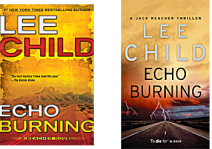Why thriller titles aren’t…thrilling
 Thriller titles often seem designed to confuse prospective readers. Pick up a book by a well-known author, read the title which is something like “Better Off Dead,” and you’re likely to think: “Did I already read that one? What was it about?”
Thriller titles often seem designed to confuse prospective readers. Pick up a book by a well-known author, read the title which is something like “Better Off Dead,” and you’re likely to think: “Did I already read that one? What was it about?”
Thriller titles have moved away from any kind of descriptive or even tangential link to the plot or characters of the book. They are in many cases an adjunct to the cover design. A “blurb” (the laudatory comments dashed all over the jacket by other writers or reviewers) distilled to two or three words. As though the title were there merely to encourage a purchase, rather than being part of the book itself.
I’m about to be unfair to Lee Child
There are plenty of examples among today’s top writers. But let’s take the example of Lee Child’s excellent Jack Reacher novels. Not long ago I caught up on a couple I’d missed. They were called “Without Fail” and “Nothing to Lose.”
“Without Fail” is about a plot to assassinate the Vice President of the US. I couldn’t tell you why it’s called “Without Fail.” As far as I remember, no one tells Reacher he has to do something “without fail.” He drinks coffee at every opportunity – without fail, you might say – but I don’t think that’s why Child called the book “Without Fail.”
In “Nothing to Lose” Reacher finds himself in rural Colorado investigating a dead body he stumbles across in the desert. I was left unsure which of the characters had “nothing to lose.” Perhaps it was Reacher, or the people (no spoilers here) who turn out to be involved in the thing he’s investigating. Or maybe it’s the reader in the airport bookshop…
Thriller titles that puzzle: Have I read this one before…?
In any case, these latest two come on the back of my earlier Reacher reading, where I pondered why “Running Blind” was called “Running Blind” (despite the tagline on the cover which said something like, “Reacher doesn’t know what the hell is going on, in fact he’s RUNNING BLIND”. Even though Reacher seemed to know what was going to happen in that book a long time before everyone else.) I still don’t know why “Worth Dying For” was called “Worth Dying For,” because Reacher never seems about to die and the people who actually die do so for despicable reasons that aren’t worth dying for.
“61 Hours” was called “61 Hours” because it took the form of a countdown. But why 61 hours? Pretty arbitrary, but at least when I stand before a shelf of Child books in a store I’m able to remember that I’ve read that one. Otherwise I get confused. It’s almost as though publishers want thrillers to have such vague titles that befuddled readers will buy the same book twice.
A special prize to anyone who can tell me if they’ve actually read the sixth Reacher novel “Echo Burning” without looking at their bookshelves.
My thriller titles
My novels have titles related to the theme or events or characters of the book. If you’re looking at a shelf of my books and you’ve read some of them, you’ll recall that “A Grave in Gaza” was the one set in Gaza; that “The Collaborator of Bethlehem” was about a collaborator and was set in Bethlehem. “The Samaritan’s Secret” was about a secret held by a Samaritan. If you haven’t read “The Fourth Assassin,” you’ll run mentally through the books you have read and think: “They didn’t have four assassins in them, but this one does, so I haven’t read it yet. Let’s buy it.” And you wouldn’t come to the end of the book saying to yourself: “Hey, I only counted three assassins,” or “Hey, there weren’t any assassins in the book at all. Were there?”
The same is true of my historical crime novels “Mozart’s Last Aria” and “A Name in Blood.” Where did I get these titles? Mozart’s sister plays his last aria. Caravaggio paints his name written in the blood spilling from the neck of a dead saint in one of his canvasses.
If War & Peace were a thriller title
Surely a good title with specific associations to the book does a better job than the genrewide vagueness for which I’ve singled out (with the sincerest of apologies) Lee Child’s superb thrillers? I’d like to invite readers of this blog to retitle some of their favorite novels as though they were contemporary thrillers. Here are a couple of suggestions to get you going:
Blood in the Snow (War and Peace, by Leo Tolstoy)
No Hope (The Trial by Franz Kafka)
Down in Flames (Catch-22 by Joseph Heller)
Last Chance (Persuasion by Jane Austen)
Ghost Chain (A Christmas Carol by Charles Dickens)
Dead Sleep (Dead Sleep by Greg Iles)… Oh wait, that’s not in the spirit of the game…
Anyhow, your suggestions are awaited….
 Write historical fiction: Finding daily details
Write historical fiction: Finding daily details
Leave a Reply